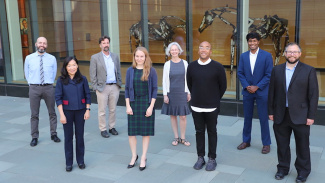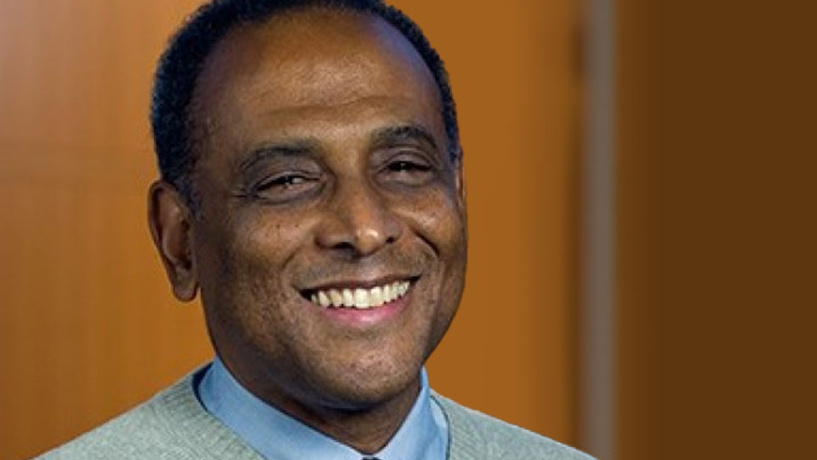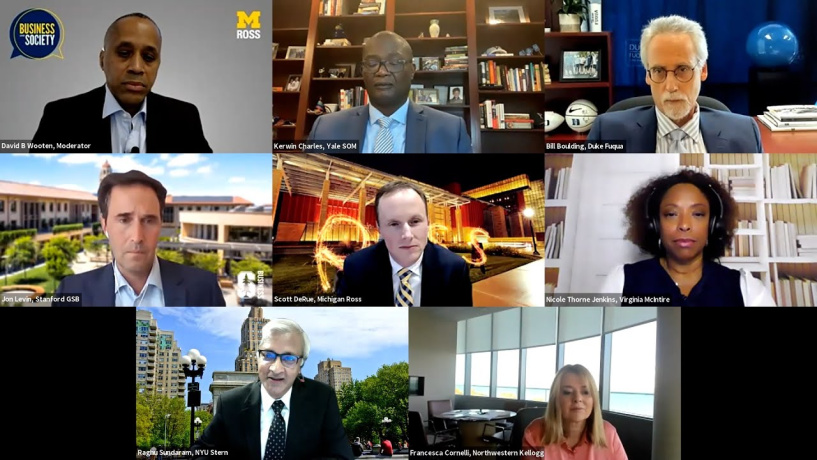Michigan Ross Expands Commitment to Diversity and Inclusion with New Research and Teaching Awards

The Ross School of Business recognized the winners of the school’s inaugural DEI Research and Teaching Awards at a special ceremony.
The new awards celebrate and honor research related to diversity, equity, and inclusion conducted at Michigan Ross, at every stage of the academic journey — from undergraduate to faculty.
“A major goal in the Ross DEI strategic plan is to promote excellence in DEI scholarship and education,” Michigan Ross Associate Dean for DEI Carolyn Yoon said. “In line with that goal, the research awards provide an incentive for faculty and students to invest in research that advances knowledge about diversity, equity, and inclusion. They also serve to communicate to the broader community that the research is highly valued.”
The faculty DEI Committee chose the winners, and each recipient spoke briefly about their research as part of the awards ceremony.
The event also recognized the first recipient of the annual J. Frank Yates Diversity and Inclusion Teaching Excellence Award, honoring a member of the teaching faculty who demonstrates a commitment to diversity and inclusion and makes a significant positive impact on the learning and personal growth of Ross students.
In her opening remarks at the ceremony, Interim Dean Francine Lafontaine noted that teaching and learning are a major focus of the school’s ongoing DEI efforts. “We are here to congratulate these awardees on their contributions, and more importantly, to hear from each of them as to how they've been doing this work and why and what it represents,” Lafontaine said.
Ross Director of Diversity and Inclusion Thomas Bell added, “Our awardees are laying foundations for the future of our work, and are clear examples of Ross' commitment to contributing to the knowledge and development in the areas of justice, equity, diversity, and inclusion.”
Below are the 2021 award winners:
BBA Senior Thesis: Karthik Nagappan
Nagappan’s thesis focuses on the effect of racial bias on Americans’ reaction to political health-reform proposals. In a study of 250 people, he found that racial bias affected attitudes toward the Affordable Care Act, even beyond political ideology. Bias also affected attitudes toward Medicare for All, though ideology played a larger role.
“It's important that we continue to pressure-test our democracy and ensure that our institutions are serving all people equitably and fairly,” Nagappan said. “I hope that this thesis provides some sort of empirical evidence and momentum to this larger narrative of social progress.”
PhD Research: Virginia Traweek
“Societal Trusted Financial Market Participation: Evidence from the Freedman's Savings Bank”
Traweek’s research focuses on a bank founded in 1865 primarily to serve newly freed people who had been enslaved. The bank failed nine years later, with its assets being returned to depositors. Traweek’s research studied the effects of different historical events on the bank and its customers, particularly emphasizing the importance of individuals’ participation in the financial system.
“The people who were hurt in the Freedman's Bank failure… are the ones that we most want to protect in the banking system,” Traweek said. “If you are more vulnerable, older, less likely to have a good high-paying job, if you're more local, you are the most important person for that bank to reach out to.... These are the people that even today are unbanked that we would like to reach out to and help. So even though the Freedman's Bank failed 150 years ago, the lessons that we learned from it are applicable today.”
Faculty Research: Mohamed Mostagir, Assistant Professor of Technology and Operations
“Social Inequality and the Spread of Misinformation”
Mostagir studied how access to resources for good information affects the spread of misinformation in a social network. He found that most communication takes place within communities, where people tend to be similar to each other in terms of income, race, religion, and so on.
“Misinformation plays a really strong role in how people form beliefs and take action,” he said. “The same social connections that help aggregate useful information can also serve as conduits for the transmission of misinformation.”
Using the COVID-19 vaccine as an example, Mostagir explained how people in communities with a lot of healthcare workers, policy makers, and scientists will have access to better information about the vaccine and therefore be more likely to get vaccinated. That makes it important to make extra effort to get correct information to marginalized communities. In particular, doing so not only improves outcomes in the marginalized communities, but makes the informed communities themselves better off, he said.
Faculty Research: Sarah Miller, Assistant Professor of Business Economics and Public Policy
Miller’s research concluded that deaths increased dramatically early in the COVID-19 pandemic for certain demographic groups in the U.S. — particularly for Black and Hispanic people, even when accounting for socioeconomic factors. In fact, the study found that the wealthiest non-Hispanic Black residents had a higher increase in mortality than the poorest non-Hispanic white residents. Hispanic residents also tended to have larger mortality increases than non-Hispanic white residents, although the differences were smaller.
“Economic factors can't completely explain these differences we observe by race and ethnicity,” Miller said. “Our conclusion from this is that policymakers should take into account this inequity that we observed when designing policies to alleviate some of these COVID-related burdens and move our society toward a more equitable health system.”
J. Frank Yates Diversity and Inclusion Teaching Excellence Award: Marcus Collins, Clinical Assistant Professor of Marketing
Collins described his doctoral work, which studied how brands and branded products spread within a community, noting that stories told within that community can be very powerful.
“The stories that we tell decide what is legitimate and what is not legitimate. This is how we learn about other people — through the media that we consume, through the stories that we tell. And the frames that we have about people, especially marginalized communities that don't own or operate the vehicles by which stories are told about themselves,” he said. He then called on the Michigan Ross community to use the power of storytelling to work toward a better world.
As members in this community, we’re telling stories. We tell stories through the work that we do as researchers, we tell stories through the cultural product that we put in the world as marketers. We tell stories in the classroom with our students. And if we are to get to a world that we all aspire to have as leaders and best, we have to tell better stories — tell better stories with our students, tell better stories with ourselves, and ultimately help shepherd in better stories to lead to the world that we all want.
Learn more about Diversity and Inclusion at Michigan Ross







